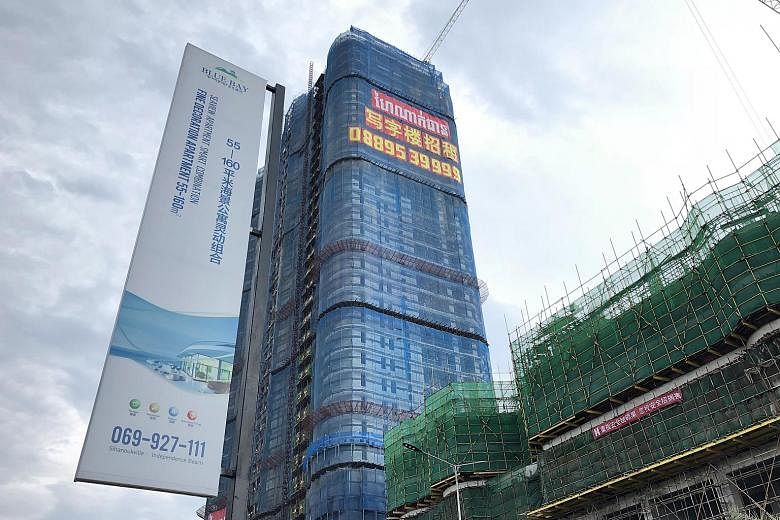SIHANOUKVILLE (Cambodia) • It was a hot, clear day. The kind of day when, a few months ago, the beach here would have been crowded with tourists deciding whether to spend US$1 (S$1.40) on a beer or fresh coconut water.
Instead, the beach was almost deserted. Women wandered with trays of fresh lobsters perfectly balanced on their heads or carried kits for performing pedicures, touting in vain for customers.
"We're not going to be able to feed ourselves soon. Our business is about to die," said Ms Doung Sokly, a 30-year-old who has been selling drinks, snacks and cigarettes from a cart on Independence Beach for the past eight years.
A block away, however, business is booming in the new casinos that have popped up in recent months. They have names like New Macau and New MGM, and they cater exclusively to Chinese guests. Cambodians are prohibited from gambling.
On this sunny afternoon when the beach was empty, the casinos were packed with Chinese customers smoking and slapping down US$100 bills on the tables.
China is trying to spread its political and economic influence across the region, particularly through its ambitious One Belt, One Road infrastructure plan. And Cambodia is trying to develop its economy without the human rights demands that Western governments tend to insist upon.
Those two interests directly coincide in Sihanoukville, a port city by the Gulf of Thailand that is named after the king who is still revered as the father of modern Cambodia. It is here that Cambodian Prime Minister Hun Sen's willingness to be embraced by China is most evident.
"Sihanoukville is kind of a poster boy for China's development. On all economic measures, China is No. 1," said Mr Carlyle Thayer, a South-east Asia expert affiliated with the Australian Defence Force Academy and a former adviser at the United States Pacific Command in Hawaii.
"China is definitely trying to displace the US and it's succeeding wonderfully."
The Cambodian government has allowed extraordinary levels of Chinese investment: Thirty casinos have already been built and 70 more are under construction.
One huge development, the Blue Bay casino and condominiums, advertises itself as "one of the iconic projects of China's One Belt, One Road initiative". The smallest studio apartments start at US$143,000, while the most prized residences cost more than US$500,000.
The number of Chinese tourists visiting Sihanoukville, a city of 90,000, doubled between 2016 and 2017 to hit 120,000 last year. Restaurants, banks, landlords, pawnshops, duty-free stores, supermarkets and hotels all display signs in Chinese.
But with the exception of those working in the hotels and casinos, most Cambodians, whose average income is US$1,100 a year, are seeing little benefit from this investment. And resentment is mounting.
"My business has halved," said seafood restaurant owner Chhim Phin, who has operated on Independence Beach since 2003.
"We used to have lots of Western tourists coming here, people who liked to try our food. But Chinese tourists don't want to eat Khmer food and experience our local customs, they prefer to eat their own food. Chinese tourists like to stay in their bubble."
THE WASHINGTON POST

